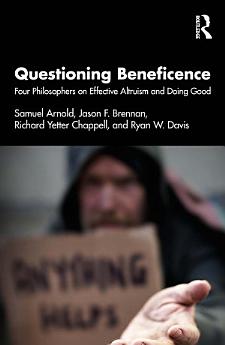Questioning Beneficence: Four Philosophers on Effective Altruism and Doing Good
Par šo e-grāmatu
Questioning Beneficence uses Effective Altruism as a launch pad to ask hard questions about beneficence more generally. Must we be Effective Altruists, or are Effective Altruism and the ideas driving the movement a mistake? How much should we give—if anything— and how should we give it? What are the respective roles of different kinds of institutions? Is charity anti-democratic and do billionaire philanthropists have too much power? Is Effective Altruism just utilitarianism in disguise?
Questioning Beneficence is written by four philosophers, each with distinct points of view. It introduces a new standard for debating ideas in philosophy as each author poses and answers three questions and each of his three co-authors responds to those questions in turn. Finally, the first author replies to his co-authors’ responses. Throughout the book, there is a spirit of curiosity, intellectual risk taking, and truth-seeking, rather than point-scoring and one-upmanship. This book demonstrates what open-minded, real dialogue on an important issue can be at its very best.
Key Features:
- Introduces a new roundtable format for philosophical debates: each of four authors takes the lead in constructing and answering three questions, each co-author then responds, and the first author then replies to the others’ responses.
- Explores salient philosophical questions raised by beneficence, like
- Can philanthropy be undemocratic?
- Why are people so bad at charity and what can we do about it?
- How important is beneficence compared to other values?
- Can Effective Altruism be part of a meaningful moral life?
- Consistently written in a clear and engaging style, suitable for both undergraduate students and curious general readers
Par autoru
Samuel Arnold is an Associate Professor of Political Science at Texas Christian University, USA. His research interests include liberalism, economic justice, and alternatives to capitalism.
Jason F. Brennan is Robert J. and Elizabeth Flanagan Family Professor of Strategy, Economics, Ethics, and Public Policy at the McDonough School of Business at Georgetown University, USA. He specializes in politics, philosophy, and economics and is the author of 16 books, including Why It's OK to Want to Be Rich (Routledge, 2020), Markets Without Limits (Routledge, 2016, with Peter Jaworksi), and Why Not Capitalism? (Routledge, 2nd Edition, 2024).
Richard Yetter Chappell is Associate Professor of Philosophy at the University of Miami, USA. His primary research interests are in ethical theory, especially the defense and development of consequentialism. Chappell is the author of Parfit’s Ethics (Cambridge University Press, 2021), and he blogs about moral philosophy at goodthoughts.blog.
Ryan W. Davis is Associate Professor of Political Science at Brigham Young University, USA. He writes about the value of autonomy in ethics, politics, and religion. He is the author of Why It’s OK to Own a Gun (Routledge, 2024).





